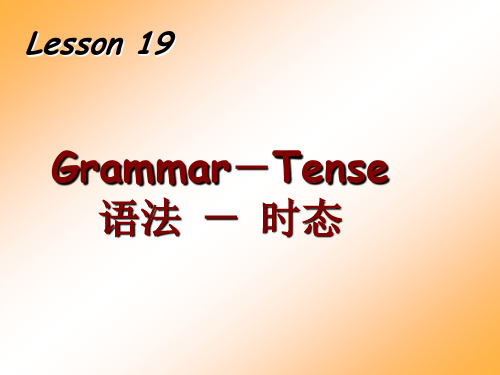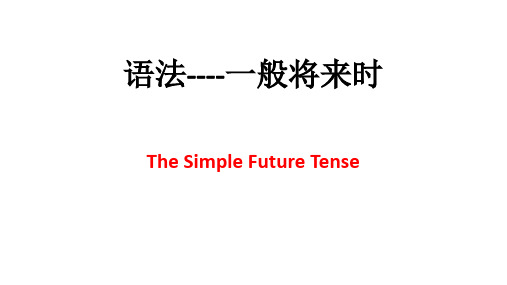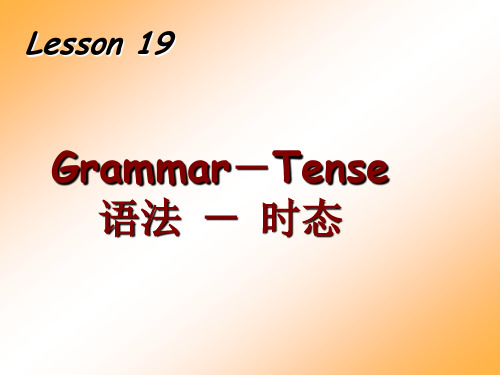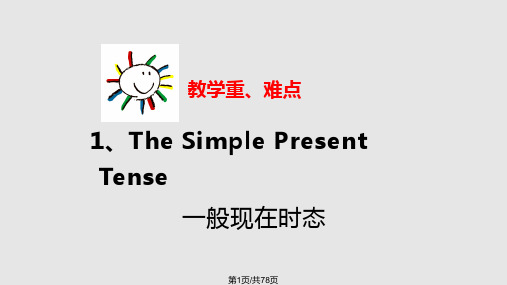一般将来时和过去将来时ppt课件
合集下载
一般将来时与过去将来时

一般疑问句及回答
• I will say… → Will you say …? Yes, I will. • You will see… → Will I see …? No, you won’t. • He will think… → Will he think…? Yes, he will. • She will talk → Will she talk…? No, she won’t. • It will run 改疑问句并回答 … • They’ll chat改疑问句并回答 … • We’ll make改疑问句并回答 …
一般将来时 小结
1、shall用于第一人称,常被will 所代替。 Which part shall I read first? Will you be at home at seven this evening? 2、be going to do (1)主语的意图,即将做某事。 (2)有迹象要发生的事。 will 主将从现用法时 ,主句只能用will,从句用一
• I will say= I’ll say • You will see= You’ll see • He will think= He’ll think • She will talk= She’ll talk • It’ll run = … • They’ll chat = … • We will make = …
初中英语 语法讲解一般将来时(共17张PPT)

主将从现练习:
6. Please tell her the news when she_____. OK, I will. A. comes B. will come. C. come D. would come 7. If he _______harder, he will get better grades soon. A. study B. studies C. will study D. studied 8. Frank _______ to see his grandma if he _______ free tomorrow. A. will come; will be B. comes; is C. will come; is D. comes; will be 9.–When will you tell him the good news? --I will tell him about it as soon as he _______ back. A. comes B. came C. will come D. is coming
一般将来时的结构:
• 常见的一般将来时有两大种结构: • 主语+ will +动词原形 • 主语+be going to +动词原形
பைடு நூலகம்
注意: 第一种结构中:will 为助动词,没有人称和数的变化, 即:I/You/He/She/We/They +will
初中英语 一般将来时课件(PPT18张)

——Yes, there is.(肯) ——No, there isn’t.(否)
2. There will be 肯定式:There will be+sth. 否定式:There will not be+sth. 一般疑问式:——Will there be+sth?
(肯)——Yes, there will. (否)——No, there will not.
注意:will(shall)+ do+sth与 be going to + do+sth 两种句型表示将来的区别
两者有时可以通用,只是单纯地预测未来的事,此时可与will互换。如: I think it is going to/will rain this evening. 我认为今晚要下雨。
但两者有时有区别:
①肯定句:主语+will+ do sth.
②否定句:主语+ will not+ do sth.
③疑问句:Will+主语+ do+sth? 简略回答: (肯) Yes,主语+shall/will.
注意缩略式:shall not=shalln’t
(否) No,主语 +shall/will not.
will not =willn’t
1.当表示主观方面“打算,准备” 去做什么事情的时候,往往用 be going to +动词原形,而will 则多用来表示纯属客观的将来。
2. There will be 肯定式:There will be+sth. 否定式:There will not be+sth. 一般疑问式:——Will there be+sth?
(肯)——Yes, there will. (否)——No, there will not.
注意:will(shall)+ do+sth与 be going to + do+sth 两种句型表示将来的区别
两者有时可以通用,只是单纯地预测未来的事,此时可与will互换。如: I think it is going to/will rain this evening. 我认为今晚要下雨。
但两者有时有区别:
①肯定句:主语+will+ do sth.
②否定句:主语+ will not+ do sth.
③疑问句:Will+主语+ do+sth? 简略回答: (肯) Yes,主语+shall/will.
注意缩略式:shall not=shalln’t
(否) No,主语 +shall/will not.
will not =willn’t
1.当表示主观方面“打算,准备” 去做什么事情的时候,往往用 be going to +动词原形,而will 则多用来表示纯属客观的将来。
一般将来时PPT课件

联系
两者都涉及将来的情况,但参照 的时间点不同。过去将来时以过 去为参照点,而一般将来时则以 现在为参照点。
与现在完成时的区别与联系
区别
现在完成时强调过去发生的动作对现在造成的影响或结果,而一般将来时则强 调未来将要发生的动作或状态。
联系
两者都涉及时间上的延续性,但方向不同。现在完成时从现在往回看,强调过 去的动作对现在的影响;而一般将来时则从现在往未来看,强调将来的动作或 状态。
bike?
解析
03 含有be动词的句子改为一般疑
问句时,将be动词提到句首, 第一人称改为第二人称。
题目
04 将“She will sing an English
song at the party.”改为否定 句。
答案
She won't sing an English song at the party.
常常和表示将来的时间状语连用,如 :tomorrow(明天),next week( 下周),from now on(从现在开始 );in the future(将来)等。
构成形式
will + 动词原形(will可以用于任何人称) 需要注意的是当主语是第一人称时 will可以换成shall,特别是在以I或we作主语的问句中,一般用shall。
05
解析
含有will的句子改为否定句时 ,在will后加not,缩写为 won't。
两者都涉及将来的情况,但参照 的时间点不同。过去将来时以过 去为参照点,而一般将来时则以 现在为参照点。
与现在完成时的区别与联系
区别
现在完成时强调过去发生的动作对现在造成的影响或结果,而一般将来时则强 调未来将要发生的动作或状态。
联系
两者都涉及时间上的延续性,但方向不同。现在完成时从现在往回看,强调过 去的动作对现在的影响;而一般将来时则从现在往未来看,强调将来的动作或 状态。
bike?
解析
03 含有be动词的句子改为一般疑
问句时,将be动词提到句首, 第一人称改为第二人称。
题目
04 将“She will sing an English
song at the party.”改为否定 句。
答案
She won't sing an English song at the party.
常常和表示将来的时间状语连用,如 :tomorrow(明天),next week( 下周),from now on(从现在开始 );in the future(将来)等。
构成形式
will + 动词原形(will可以用于任何人称) 需要注意的是当主语是第一人称时 will可以换成shall,特别是在以I或we作主语的问句中,一般用shall。
05
解析
含有will的句子改为否定句时 ,在will后加not,缩写为 won't。
一般将来时与过去将来时

2. be about to +不定式,意为马上做某事。
e.g. He is about to leave for Beijing. 他马上要去北京。
区别:be about to do 不能与 tomorrow, next week 等表示明确将来时的时间状语连用。
一般将来时的否定、 疑问及回答
一般将来时的肯定句
• Shall I go home now? (请求) • Shall we take different routes? (建议)
2. be going to do 的含义
be going to do 用于表示计划、打算去做某事(强 调主观意愿);还可以表示根据事实情况,有 迹象极有可能发生的事。如:
学习过去将来时需要注意的问题:
1. 过去将来时和一般将来时的用法区别
I _w__il_l_/_sh_a_l_l_w__ri_t_e_/a_m__g_o_i_n_g_t_o__w_r_it_e_______ (write) a letter next week.
She said she __w_o_u_l_d_w__r_it_e_/w__a_s_g_o_i_n_g_t_o_w__r_it_e____ (write) a letter the next week.
• When I _w__a_s _ (be) seven years old ,I
e.g. He is about to leave for Beijing. 他马上要去北京。
区别:be about to do 不能与 tomorrow, next week 等表示明确将来时的时间状语连用。
一般将来时的否定、 疑问及回答
一般将来时的肯定句
• Shall I go home now? (请求) • Shall we take different routes? (建议)
2. be going to do 的含义
be going to do 用于表示计划、打算去做某事(强 调主观意愿);还可以表示根据事实情况,有 迹象极有可能发生的事。如:
学习过去将来时需要注意的问题:
1. 过去将来时和一般将来时的用法区别
I _w__il_l_/_sh_a_l_l_w__ri_t_e_/a_m__g_o_i_n_g_t_o__w_r_it_e_______ (write) a letter next week.
She said she __w_o_u_l_d_w__r_it_e_/w__a_s_g_o_i_n_g_t_o_w__r_it_e____ (write) a letter the next week.
• When I _w__a_s _ (be) seven years old ,I
时态—过去将来时(英语语法课件)

课后任务
请用过去将来时翻译My father一文中缺失的句子,使文章变得完整。 (1)从那时候起,我一直认为我将来长大后会成为一名歌手。 (2)他告诉我,我需要多听来训练我的节奏感。 (3)我们一直希望好事会发生,爸爸会变好。 (4)护士说,我可以给爸爸多唱唱歌。 (5)他知道他的预言一定会实现。
Our lives changed when Dad was told that he had cancer. (3)
,
but the doctors told us that they could not save him.
About a week before my dad died,he fell into a coma (昏迷) .The nurses said even
. The look of pride
on his face made me happy.
My life was full of concerts,singing lessons and laughter. Though my mum and
brothers helped me,they did not share our love for music.
After dinner,Dad would often ask me to sing. He always said I sang I Will
初中英语八大时态PPT课件

play s
closes
go es studyies gets read s bring s watches
carryies do es wash es visit s exercise s enjoy s jump s hhaavse
第5页/共78页
一般现在时否定式
be + not don’t do /
I am a teacher. You are a worker. He is a student.
We are friends.
Are you a teacher?
疑 问
Are you a worker?
句 Is he a student?
Are you friends?
第9页/共78页
2.对于实意动词,疑问句要求是:当主 语是他(he),她(she),它(it)时,句子前 面加does,并把动词恢复原形;当主语 是其他人称时,句前加do ,第一人称 (I/we) 换第二人称(you)。
第19页/共78页
3、 辅音加y结尾,变y为i加ed
I study in Beijing.
Study,copy
I studied in Beijing . Cry ,fly
4、重读闭音节结尾,双写词尾字母加ed
she stops. she stopped.
一般将来时课件(PPT)

用现在进行时表示
总结词
表示将来某个时间点正在进行的动作或状态。
详细描述
使用现在进行时来代替将来时,表示将来某个时间点正在进行的动作或状态,例如 "We are meeting next week."(下周我们将见面)。
用一般现在时表示
总结词
表示习惯性或经常发生的动作或状态。
详细描述
在某些情况下,使用一般现在时可以 表示将来某个时间点将要发生的动作 或状态,例如"The train leaves at 8:00."(火车8点离开)。
将来时态的构成
01
基本构成
will + 动词原形
02
03
04
肯定句
主语 + will + 动词原形 + 其 他成分
否定句
主语 + will not + 动词原形 + 其他成分
疑问句
Will + 主语 + 动词原形 + 其 他成分
ቤተ መጻሕፍቲ ባይዱ
02
一般将来时的句型结构
will+动词原形
总结词
表示将来某个时间点将要发生的动作 或状态。
现在进行时表示
总结词
用现在进行时表示将来动作,强调即将发生的动作。
详细描述
这种表达方式常用于表示即将发生的动作,例如“I am meeting my friend tomorrow”。
英语八大时态PPT课件(详细版)

4
※表示主语所具有的特征、性格、 能力、状态等 She is a middle school student. She looks a little worried. ※某些以here/there开头的句子 中,用一般现在时表正发生的动 作 Here comes the bus.
5
※表示将来发生的、时刻表上不改变的事 The train leaves Hunan at five o’clock. ※特殊情况 在时间状语从句和条件状语从句中,若主 句用一般将来时,则从句用一般现在代替 将来。(主将从现) I’ll see you when I get there.
If it doesn’t rain tomorrow,we’ll go shopping.
6
常与一般现在时连用的时间状语有:
often 经常
usually 通常
never 从不
every day 每天
sometimes 有时
seldom 几乎不
always 总是
once a week一周一次
7
【翻译】
16
1、构成 一般过去时用动词的过
去式表示。除系动词be的过去式 有人称和数的变化外,其他动词 的过去式无人称和数的变化。
17
2、用法
※表示过去已经发生的动作,现在 已经结束,常与相应的过去时间状 语连用。 Tom fell ill last night , and he had to stay at home.
※表示主语所具有的特征、性格、 能力、状态等 She is a middle school student. She looks a little worried. ※某些以here/there开头的句子 中,用一般现在时表正发生的动 作 Here comes the bus.
5
※表示将来发生的、时刻表上不改变的事 The train leaves Hunan at five o’clock. ※特殊情况 在时间状语从句和条件状语从句中,若主 句用一般将来时,则从句用一般现在代替 将来。(主将从现) I’ll see you when I get there.
If it doesn’t rain tomorrow,we’ll go shopping.
6
常与一般现在时连用的时间状语有:
often 经常
usually 通常
never 从不
every day 每天
sometimes 有时
seldom 几乎不
always 总是
once a week一周一次
7
【翻译】
16
1、构成 一般过去时用动词的过
去式表示。除系动词be的过去式 有人称和数的变化外,其他动词 的过去式无人称和数的变化。
17
2、用法
※表示过去已经发生的动作,现在 已经结束,常与相应的过去时间状 语连用。 Tom fell ill last night , and he had to stay at home.
一般将来时PPT课件逐字稿

纠正方法
明确一般将来时的概念,即表示将来某一时间要发生的动作 或存在的状态。与现在进行时等其他时态区分开,避免混淆 。
忽略标志性词语导致误解
错误示例
忽略表示将来的标志性词语,如“tomorrow”、“next week”等,导致句子时态不 清。
纠正方法
在表达将来时动作或状态时,注意使用标志性词语,明确表明动作或状态发生的时间。 同时,也要注意上下文语境,确保时态的一致性和准确性。
常用于表示计划、打算或预测未 来的情况,也可以表示现在决定 将来的情况。
构成形式
will + 动词原形
表示将来发生的动作或状态,如“I will go to the park tomorrow.”(我明天将去公园 )。
be going to + 动词原形
表示计划、打算或预测未来的情况,如“I am going to study hard for the exam.”( 我打算努力学习以应对考试)。
例如
I will go to the park tomorrow. 我明天要去公 园。
来自百度文库
表示计划、打算或准备做某事
含义
表示已经计划好或打算要做的动作,强调主观意 愿。
结构
be going to + 动词原形
例如
I'm going to buy a new car next year. 我打算 明年买一辆新车。
明确一般将来时的概念,即表示将来某一时间要发生的动作 或存在的状态。与现在进行时等其他时态区分开,避免混淆 。
忽略标志性词语导致误解
错误示例
忽略表示将来的标志性词语,如“tomorrow”、“next week”等,导致句子时态不 清。
纠正方法
在表达将来时动作或状态时,注意使用标志性词语,明确表明动作或状态发生的时间。 同时,也要注意上下文语境,确保时态的一致性和准确性。
常用于表示计划、打算或预测未 来的情况,也可以表示现在决定 将来的情况。
构成形式
will + 动词原形
表示将来发生的动作或状态,如“I will go to the park tomorrow.”(我明天将去公园 )。
be going to + 动词原形
表示计划、打算或预测未来的情况,如“I am going to study hard for the exam.”( 我打算努力学习以应对考试)。
例如
I will go to the park tomorrow. 我明天要去公 园。
来自百度文库
表示计划、打算或准备做某事
含义
表示已经计划好或打算要做的动作,强调主观意 愿。
结构
be going to + 动词原形
例如
I'm going to buy a new car next year. 我打算 明年买一辆新车。
中考英语过去将来时趣味讲解动态课件(43张PPT)

过去将来时否定句 • 主语 + would + 动词原形 +其他. • 主语 + wasn’t / weren’t going to + 动词原形 +其他.
知识清单
过去将来时一般疑问句 • Would + 主语 + 动词原形 + 其他? • Was / Were + 主语 + going to + 动词原形 + 其他?
探索发现
• I said that I would be a hokage(火影). • I decided that I would work hard to
achieve my dream. • I firmly believed that I would be the
best one.
探索发现
探索发现
• I would be a hokage(火影). • I would work hard to achieve my dream. • I would be the best one.
would 动词原形
打回原形
would
went go
打回原形
would
saw see
打回原形
would
真题派送
3. Tom said he ____happy if Tina ____ to China the next week.
A. was; come B. was; would come C. would be; came D. will be; come
知识清单
过去将来时一般疑问句 • Would + 主语 + 动词原形 + 其他? • Was / Were + 主语 + going to + 动词原形 + 其他?
探索发现
• I said that I would be a hokage(火影). • I decided that I would work hard to
achieve my dream. • I firmly believed that I would be the
best one.
探索发现
探索发现
• I would be a hokage(火影). • I would work hard to achieve my dream. • I would be the best one.
would 动词原形
打回原形
would
went go
打回原形
would
saw see
打回原形
would
真题派送
3. Tom said he ____happy if Tina ____ to China the next week.
A. was; come B. was; would come C. would be; came D. will be; come
2024版高中一般将来时PPT课件图文

fly-flies,study-studies。
以“s”,“x”,“ch”,“sh”等结尾的动词,词…
miss-misses,watch-watches。
不规则动词记忆技巧
分类记忆
将不规则动词按照一定规律进行 分类,如:AAA型(原形、过去 式、过去分词同形),如:cutcut-cut;ABB型(过去式与过去 分词同形),如:buy-bought-
用be going to表示
be going to+动词原形,表示计划、安排将要做的事或根据迹象推测必然要发 生的事,例如:We are going to have a meeting tomorrow.(我们明天要开 会。)
预测、计划和打算
预测未来
一般将来时可以用于表达对未来的预测,常跟表示时间状语的从句连用,例如:It is going to rain.(天要下雨了。)
礼貌原则在跨文化交际中应用
尊重对方文化
01
在跨文化交际中,应尊重对方的文化背景和习惯,避免使用可
能引起误解或冲突的未来表达方式。
谨慎承诺
02
在不确定能否履行承诺的情况下,应谨慎使用过于确定的未来
表达方式,以免造成不必要的误解或压力。
适时调整
03
根据交际的进展和对方的反馈,适时调整自己的未来表达方式,
表示客观必然性
有些情况下,一般将来时 可以表示客观必然性,如 The sun will rise tomorrow.
以“s”,“x”,“ch”,“sh”等结尾的动词,词…
miss-misses,watch-watches。
不规则动词记忆技巧
分类记忆
将不规则动词按照一定规律进行 分类,如:AAA型(原形、过去 式、过去分词同形),如:cutcut-cut;ABB型(过去式与过去 分词同形),如:buy-bought-
用be going to表示
be going to+动词原形,表示计划、安排将要做的事或根据迹象推测必然要发 生的事,例如:We are going to have a meeting tomorrow.(我们明天要开 会。)
预测、计划和打算
预测未来
一般将来时可以用于表达对未来的预测,常跟表示时间状语的从句连用,例如:It is going to rain.(天要下雨了。)
礼貌原则在跨文化交际中应用
尊重对方文化
01
在跨文化交际中,应尊重对方的文化背景和习惯,避免使用可
能引起误解或冲突的未来表达方式。
谨慎承诺
02
在不确定能否履行承诺的情况下,应谨慎使用过于确定的未来
表达方式,以免造成不必要的误解或压力。
适时调整
03
根据交际的进展和对方的反馈,适时调整自己的未来表达方式,
表示客观必然性
有些情况下,一般将来时 可以表示客观必然性,如 The sun will rise tomorrow.
一般将来时课件(PPT)

主语 + will not (won't) + 动 词原形 + 其他成分
主语 + be not going to (ben't going to) + 动词原形 + 其他成分
There + will not be (won't be) + 主语 + 其他成分
疑问句结构
Will + 主语 + 动词原形 + 其他 成分?
与现在进行时的对比
现在进行时表示当前正在进行的动作或状态,而一般将来 时则表示将来某个时间要发生的动作或存在的状态。
与过去将来时的对比
过去将来时表示从过去某个时间看将要发生的动作或存在 的状态,而一般将来时则是从现在这个时间点看将来要发 生的动作或存在的状态。
练习题及解析
1. 题目
I _____ (go) to the park tomorrow.
如果先行词是过去将来时态,定语从 句要使用过去将来时态。
06
总结回顾与拓展延伸
重点难点总结
一般将来时的基本形式
一般将来时的否定形式
will + 动词原形,表示将来某个时间要发生 的动作或存在的状态。
will not (won't) + 动词原形,表示将来某 个时间不会发生的动作或状态。
过去将来时的课件

should/would+动词原形”构成,但should一 般只用于第一人
5. 上次我见到你时,你正打算开始乘火 车去西藏。
误:Last time I saw you, you had
started to go to Tibet by train. 正:Last time I saw you, you were
not do?
Would
二、三 you/they/he/she/it
do?
Would you/they/he/she/it
not do?
缩写形式:
肯定式:
I’d, you’d, he’d, she’d, we’d, they’d, it’d 否定式:
I’d/you’d/he’d/she’d/we’d/they’d/it’d not 或I/you/he/she/we/they/it wouldn’t 或I/we shouldn’t
vegetables.
A. are going to grow B. were going to grow
C. will grow
D. have grown
10. She ______ to work when the telephone rang.
A. is going
B. will go
C. was going D. is to go
5. 上次我见到你时,你正打算开始乘火 车去西藏。
误:Last time I saw you, you had
started to go to Tibet by train. 正:Last time I saw you, you were
not do?
Would
二、三 you/they/he/she/it
do?
Would you/they/he/she/it
not do?
缩写形式:
肯定式:
I’d, you’d, he’d, she’d, we’d, they’d, it’d 否定式:
I’d/you’d/he’d/she’d/we’d/they’d/it’d not 或I/you/he/she/we/they/it wouldn’t 或I/we shouldn’t
vegetables.
A. are going to grow B. were going to grow
C. will grow
D. have grown
10. She ______ to work when the telephone rang.
A. is going
B. will go
C. was going D. is to go
英语语法一般将来时 课件 (共35张PPT)

afternoon。
选择:要动动脑啦
1. My younger brother ____be 15 years old next year.
A. will B. is going C. should
2. — Sorry, I forgot to post the letter for you.
— Never mind, _____ post it myself tonight.
2.与“next一家” 连用
next
_ti_m_e_(下一次)
year week month term Monday Sunday morning ……
3.与“in+一段时间” 连用 “在…之
后” three days
in
a week two months
20 years
People w…i…ll live on the moon in 20 years.
homework at eight today.
2.这周六我们打算去野餐。
We _a_r_e__g_o_i_n_g__to__ have a picnic this
Saturday..
3. 我妈妈今天下午将要去购物。 My mother _w_i_ll_g_o_s_h_o_p_pin_g___ this
3.一般疑问句:Be+ 主语 + going to + V原型 肯定回答: Yes, 主语 + be 否定回答:No, 主语 +be +not
选择:要动动脑啦
1. My younger brother ____be 15 years old next year.
A. will B. is going C. should
2. — Sorry, I forgot to post the letter for you.
— Never mind, _____ post it myself tonight.
2.与“next一家” 连用
next
_ti_m_e_(下一次)
year week month term Monday Sunday morning ……
3.与“in+一段时间” 连用 “在…之
后” three days
in
a week two months
20 years
People w…i…ll live on the moon in 20 years.
homework at eight today.
2.这周六我们打算去野餐。
We _a_r_e__g_o_i_n_g__to__ have a picnic this
Saturday..
3. 我妈妈今天下午将要去购物。 My mother _w_i_ll_g_o_s_h_o_p_pin_g___ this
3.一般疑问句:Be+ 主语 + going to + V原型 肯定回答: Yes, 主语 + be 否定回答:No, 主语 +be +not
相关主题
- 1、下载文档前请自行甄别文档内容的完整性,平台不提供额外的编辑、内容补充、找答案等附加服务。
- 2、"仅部分预览"的文档,不可在线预览部分如存在完整性等问题,可反馈申请退款(可完整预览的文档不适用该条件!)。
- 3、如文档侵犯您的权益,请联系客服反馈,我们会尽快为您处理(人工客服工作时间:9:00-18:30)。
3) 有些位移动词的现在进行时可以表示将来时 的含义 ,如 come , go , leave 等 Eg: (1)Mr. Black is going back to London.
.
(2)Be quick ! The bus is leaving soon .
3. will 以及 shall 有时在一般疑问句中用来 表示一种有礼貌的请求或者问询
Eg: --- Would you please carry the box to the fifth floor ?
--- No problem !
---Would you like to have dinner with me ?
---Yes, I’d love to .
.
一般将来时与过去将来时
.
一 般 将 来 时:
概念: 表示从现在开始将来要发生的 动作或存在的状态。
.
1.标志性的词: soon, tomorrow, next time, 2. in a week, the day after tomorrow
2. 构成形式: 1) will / shall do sth
注意: will 和 be going to de 区别在于 will 没有人为的因素, 而 be going to 强调计划性 和准备性,常译成 准备/计划做… Eg: (1) Next year I will be 17 years old .
(2)After the final exam we’re going to take a long holiday in Hainan Island .
to see us dance . I didn’t think it would rain . But lat it kept raining for two hours . 两种构成变化形式和一般将来时一样. eg, There wasn’t going to be an evening.
.
2. would 在一般疑问句中表示非常委婉有礼 貌的语气.
Eg: (1)-- Will you open the door for me ? ---It’s my pleasure .
(2)--- Shall we go to the sea ? --- Good idea ! 4. 在时间以及条件状语从句中,主句将来时, 从句要用一般现在时.
Eg:(1) He won’t leave until he finds his bag.
Foreign Language University next term
(2)Mum is going to cook Beijing Duck
onight .
be
(3) There is going to ________ a tbaelk
omorrow morning . = There will ______ .
其中 will 可用于任何人称, 而 shall 只可以 用于第一人称 Eg: I will go swimming tomorrow .
My father will go to work in Beijing. We will have a meeting next week . The flowers will be watered before 6
(2)If her father stops smoking , her mother will send him . a big present .
过去将来时
概念: 表示从过去某个时间算起的将
要发生的动作或存在的状态,但 整个已经过去了.
.
1.构成: 2. 1) would / should do sth 2) was / were going to do sth Eg: The teacher said she would come
.
否定结构在 will 后加 not, 缩写为 woBaidu Nhomakorabea’t 一般疑问句将 will 提前。 Eg: (1) We won’t visit uncle Wang soon . (2)Will you have classes on Sunday ?
2) be going to do sth
Eg: (1)I am going to study in Shanghai
.
(2)Be quick ! The bus is leaving soon .
3. will 以及 shall 有时在一般疑问句中用来 表示一种有礼貌的请求或者问询
Eg: --- Would you please carry the box to the fifth floor ?
--- No problem !
---Would you like to have dinner with me ?
---Yes, I’d love to .
.
一般将来时与过去将来时
.
一 般 将 来 时:
概念: 表示从现在开始将来要发生的 动作或存在的状态。
.
1.标志性的词: soon, tomorrow, next time, 2. in a week, the day after tomorrow
2. 构成形式: 1) will / shall do sth
注意: will 和 be going to de 区别在于 will 没有人为的因素, 而 be going to 强调计划性 和准备性,常译成 准备/计划做… Eg: (1) Next year I will be 17 years old .
(2)After the final exam we’re going to take a long holiday in Hainan Island .
to see us dance . I didn’t think it would rain . But lat it kept raining for two hours . 两种构成变化形式和一般将来时一样. eg, There wasn’t going to be an evening.
.
2. would 在一般疑问句中表示非常委婉有礼 貌的语气.
Eg: (1)-- Will you open the door for me ? ---It’s my pleasure .
(2)--- Shall we go to the sea ? --- Good idea ! 4. 在时间以及条件状语从句中,主句将来时, 从句要用一般现在时.
Eg:(1) He won’t leave until he finds his bag.
Foreign Language University next term
(2)Mum is going to cook Beijing Duck
onight .
be
(3) There is going to ________ a tbaelk
omorrow morning . = There will ______ .
其中 will 可用于任何人称, 而 shall 只可以 用于第一人称 Eg: I will go swimming tomorrow .
My father will go to work in Beijing. We will have a meeting next week . The flowers will be watered before 6
(2)If her father stops smoking , her mother will send him . a big present .
过去将来时
概念: 表示从过去某个时间算起的将
要发生的动作或存在的状态,但 整个已经过去了.
.
1.构成: 2. 1) would / should do sth 2) was / were going to do sth Eg: The teacher said she would come
.
否定结构在 will 后加 not, 缩写为 woBaidu Nhomakorabea’t 一般疑问句将 will 提前。 Eg: (1) We won’t visit uncle Wang soon . (2)Will you have classes on Sunday ?
2) be going to do sth
Eg: (1)I am going to study in Shanghai
